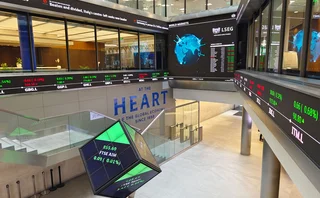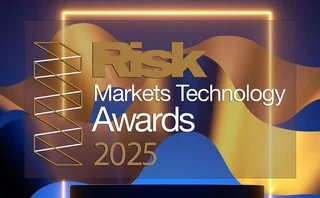
Market data vendor of the year: IHS Markit
Asia Risk Technology Awards 2020

The global pandemic has shed light on the flaws in how financial institutions model credit risk. As many of those models have traditionally been developed using standard financial statements and conventional economic forecasts, investors in Asia-Pacific and elsewhere soon realised they were insufficient to assess the impact of the coronavirus on their portfolios properly.
Any pre-Covid assumptions based on financial statements and short-term projections are no longer relevant. Macroeconomic data also lacks the granularity that investors need to make better-informed decisions.
IHS Markit provides buy- and sell-side firms with a suite of data solutions and tools aimed at helping them thrive in the post-Covid world. The company’s philosophy is structured to identify, source and integrate high-quality financial, economic and business data within customisable, transparent datasets and solutions that customers can access online or deploy on site.
In addition to financial information, IHS Markit also provides up-to-the-minute business and industry data.
Kiet Tran, head of financial services for Asia-Pacific at IHS Markit, says that given the current Covid-19 situation, many firms are accelerating digital adoption. One of the core pillars of that involves being a data-driven organisation.
The interesting challenge there, he says, is that a lot of the data that companies have historically relied upon, which they considered to be leading indicators, are now becoming lagging indicators instead.
“One example is published GDP numbers: in this scenario that we’re currently in, a lot of them are lagging. We see a need for firms to look at different and new insights to further connect the puzzle, whether it’s to understand the risk exposure of the banking book or understand their core allocation that they have across public and private markets,” he says.
IHS Markit’s focus is on continuing to invest in more localised datasets across Asia. One of Asia’s nuances compared to markets in the West is that different market players fund corporate credits. In the West, Tran says, the capital markets fund 75% of corporate credits through a bond or a loan issuance. But in Asia, 80% of corporate credit is funded by the banks, so a lot of it is still sitting on banks’ balance sheets.
“The challenge is that banks are trying to de-risk as a result of Covid, and because of global regulations such as Basel, banks’ balance sheets are shrinking. So you do need better, stronger and bigger capital markets. To have healthy capital markets, you need good data, right? This is why we will continue to build our localised capital markets data and really leverage some of our connectivity across the board, whether it’s our fixed income book building, or our traditional credit data ecosystem. And it’s really about localising data to help the Asian market grow,” he adds.
The reality is we’re sitting on 20 petabytes of data. For us, it’s about bringing all that alternative data into a place that’s easy for someone to search
Kiet Tran, IHS Markit
Another theme that IHS Markit is devoting more attention to is environmental, social, and governance (ESG) and ESG-focused indexes. In particular, the firm is looking at the impact aspect of ESG. “I do think many companies, including LPs [limited partnerships] and fund managers, are looking at not just risk and reward, but risk, reward and impact. With ESG, impact is very important, especially when you look at the data, which is why that’s an area that we’re heavily focused on investing in at the moment,” Tran says.
Data can be used to generate new ideas and look for opportunities.
“The reality is we’re sitting on 20 petabytes of data. For us, it’s about bringing all that alternative data into a place that’s easy for someone to search,” Tran says.
This is where IHS Markit’s Data Lake comes in. The Data Lake offering, which has been available to clients since May 18, currently has roughly 1,000 proprietary datasets from the financial services, energy and resources, and transportation sectors.
The cloud-based platform stores, catalogues and governs access to structured and unstructured data. Using the catalogue, clients can search and explore IHS Markit’s datasets via a standardised taxonomy.
As the platform allows clients to use the tools they need to work with their own and IHS Markit’s proprietary data in one place, Tran says Data Lake will help firms speed up the ideation process.
“We have made it easy to access, analyse and integrate vast datasets, which we think will help that time-to-ideation equation. But more importantly, it’s giving a bank or a buy-side firm alternative ways of looking at the marketplace to discover new leading indicators,” he says.
For example, Purchasing Managers’ Index data, an economic indicator of trends in the manufacturing and service sectors, is a much better leading indicator of the state of an economy or certain industries or sectors than GDP data. IHS Markit recently launched a PMI dataset broken down by country, sector and industry. “So now you have a much more detailed view on what’s going on. And that gives better colour to investors,” Tran says.
One of the Asia Risk awards judges points out that IHS Markit has “very extensive data coverage – globally and in Asia”. The Data Lake offering is also interesting, the judge says, and he would like to see more information on it in the future.
Only users who have a paid subscription or are part of a corporate subscription are able to print or copy content.
To access these options, along with all other subscription benefits, please contact info@risk.net or view our subscription options here: http://subscriptions.risk.net/subscribe
You are currently unable to print this content. Please contact info@risk.net to find out more.
You are currently unable to copy this content. Please contact info@risk.net to find out more.
Copyright Infopro Digital Limited. All rights reserved.
As outlined in our terms and conditions, https://www.infopro-digital.com/terms-and-conditions/subscriptions/ (point 2.4), printing is limited to a single copy.
If you would like to purchase additional rights please email info@risk.net
Copyright Infopro Digital Limited. All rights reserved.
You may share this content using our article tools. As outlined in our terms and conditions, https://www.infopro-digital.com/terms-and-conditions/subscriptions/ (clause 2.4), an Authorised User may only make one copy of the materials for their own personal use. You must also comply with the restrictions in clause 2.5.
If you would like to purchase additional rights please email info@risk.net
More on Awards
Clearing house of the year: LCH
Risk Awards 2025: LCH outshines rivals in its commitment to innovation and co-operation with clearing members
Best use of machine learning/AI: CompatibL
CompatibL’s groundbreaking use of LLMs for automated trade entry earned the Best use of machine learning/AI award at the 2025 Risk Markets Technology Awards, redefining speed and reliability in what-if analytics
Markets Technology Awards 2025 winners’ review
Vendors jockeying for position in this year’s MTAs, as banks and regulators take aim at counterparty blind spots
Equity derivatives house of the year: Bank of America
Risk Awards 2025: Bank gains plaudits – and profits – with enhanced product range, including new variants of short-vol structures and equity dispersion
Law firm of the year: Linklaters
Risk Awards 2025: Law firm’s work helped buttress markets for credit derivatives, clearing and digital assets
Derivatives house of the year: UBS
Risk Awards 2025: Mega-merger expected to add $1 billion to markets revenues, via 30 integration projects
Interest rate derivatives house of the year: JP Morgan
Risk Awards 2025: Steepener hedges and Spire novations helped clients navigate shifting rates regime
Currency derivatives house of the year: UBS
Risk Awards 2025: Access to wealth management client base helped Swiss bank to recycle volatility and provide accurate pricing for a range of FX structures







